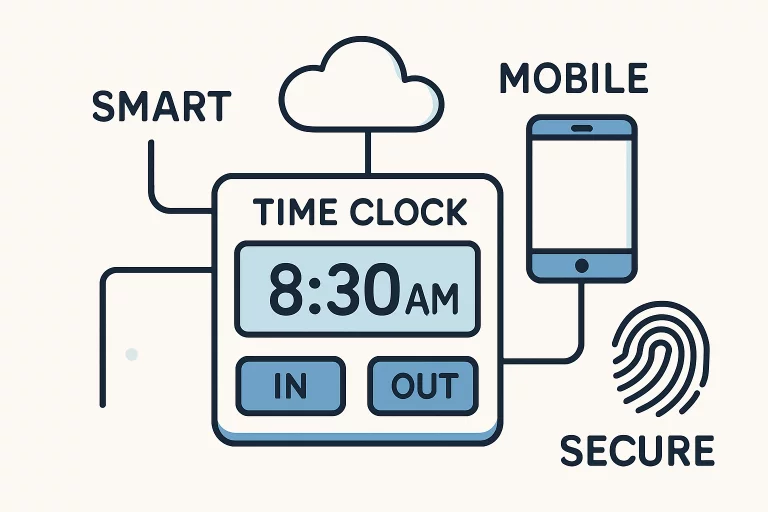Modern Trends in Employee Time Tracking Systems
In today’s rapidly evolving and competitive workplace landscape, tracking employee hours is no longer just about monitoring presence; it has become a key factor in driving organizational productivity and upholding regulatory compliance. For industries with strict oversight, such as healthcare, implementing an employee time clock for healthcare compliance ensures precise tracking, supports audit readiness, and aligns with labor and patient care standards.
Modern employee time clock solutions offer unprecedented advantages as businesses navigate increasingly complex labor laws and heightened employee expectations. They ensure accuracy in data capture, reduce administrative burdens, and help organizations stay adaptable in the face of new and dynamic work models.
Powered by cutting-edge technology, these systems go far beyond the traditional punch clock, enabling organizations to reimagine their workforce management strategies and create environments that foster efficiency and engagement.
Contents
AI-Powered Automation
AI-driven automation creates a seismic shift in how organizations monitor and manage employee time. Through smart algorithms and machine learning, modern time tracking systems can automate much of the tedious, repetitive data entry that has traditionally been labor-intensive. In high-demand environments, a hospital time clock leverages this automation to streamline workforce management, ensure compliance, and maintain accurate staffing records.
This minimizes human error, eliminates the inefficiencies of manual processes, and trims down the time previously spent on administrative tasks. AI-powered tools can also analyze intricate attendance and shift schedule patterns, flag anomalies such as irregular clock-ins, missed punches, or potential time theft. With actionable insights, managers are better positioned to reallocate resources, anticipate overtime needs, and optimize shift scheduling to prevent costly backlogs.
Biometric Authentication
In industries where accuracy, security, and compliance are non-negotiable—such as healthcare and government—biometric authentication has emerged as a gold standard. Organizations can guarantee that only authorized employees can access time recording systems by utilizing fingerprint scanners, facial recognition systems, or even advanced iris scanning.
This innovation wipes out longstanding issues such as “buddy punching,” where employees clock in or out on behalf of each other, which can be a significant source of payroll fraud and compliance risks. Every recorded attendance event is unique and traceable, creating an irrefutable log for audits and day-to-day management.
As the technology becomes more user-friendly and affordable, the workplace deployment of biometric authentication is expanding rapidly. Companies can strengthen physical and digital security while increasing employee trust in payroll accuracy and fairness. These solutions can be implemented seamlessly alongside other technologies, resulting in a comprehensive, tamper-resistant time tracking infrastructure.

Mobile and Cloud-Based Solutions
The acceleration toward remote and hybrid work has significantly influenced the adoption of mobile and cloud-based time tracking systems. These solutions offer unmatched flexibility and scalability, enabling organizations to support dispersed teams, accommodate fluctuating shift patterns, and onboard new employees quickly without heavy up-front IT investments. Employees can now log their hours from any device—a smartphone, tablet, or laptop—whether on a job site, working from home, or traveling between client locations.
Modern mobile apps often include features such as GPS tracking and geofencing, providing organizations with additional layers of security and verification. These tools are invaluable for verifying time entries in fieldwork or off-site projects, ensuring employees are exactly where they need to be at the right times.
Integration with Project Management Tools
One of the most impactful trends in workforce management is the tight integration of time tracking solutions with project management platforms. By linking individual and team time entries directly to projects, tasks, and deliverables, organizations can gain a granular view of how labor hours are distributed across departments and key initiatives.
This integrated data streamlines payroll processing and delivers strategic business insights, enabling managers to accurately analyze the time (and corresponding cost) spent on critical tasks, identify workflow bottlenecks, and adjust resource allocations for peak efficiency.
Focus on Employee Well-Being
The new generation of time tracking solutions strongly emphasizes supporting employee well-being and preventing burnout. Platforms are now built with features that prompt workers to take regular breaks, notify employees of looming overtime, and provide managers with insights about workload trends and overtime patterns. Such capabilities are invaluable in promoting a culture of balance, where employees feel supported and valued, rather than micromanaged.
Alongside these efforts, incorporating employee recognition into daily workflows reinforces a sense of appreciation and encourages healthy work habits. A simple acknowledgment for consistent effort or thoughtful contributions can go a long way in maintaining morale and reducing burnout.
Employers also leverage analytics from time tracking systems to identify and address unhealthy work patterns, intervening proactively to adjust shifts, redistribute workload, or offer additional resources where needed. This not only helps reduce costly absenteeism due to burnout, stress, or overwork but also demonstrates a commitment to employee health and sustainability.
Enhanced Data Security and Privacy
With increasing amounts of sensitive data being processed, the security and privacy of time tracking systems have never been more critical. Modern solutions employ the latest encryption methods and multi-factor authentication to prevent unauthorized access, ensuring the integrity and confidentiality of all workforce data.
Strict adherence to data privacy regulations such as GDPR in Europe or HIPAA for U.S. healthcare organizations is now a standard expectation, helping businesses avoid legal penalties while fostering employee trust.
Transparent policies about data handling and regular staff training on security protocols reinforce the ethical management of personal information. Employees need to know that their data is protected and how it is being used. Organizations communicating openly about their data practices are better placed to cultivate a culture of trust, compliance, and accountability.
Conclusion
The modern workplace demands flexible, secure, and intelligent time tracking tools to ensure compliance, enhance efficiency, and support a thriving employee experience. Staying ahead of trends such as AI-powered automation, biometric authentication, mobile and cloud access, and project management integration gives organizations a distinct competitive edge.
Additionally, emphasizing employee well-being and robust data security helps foster a positive culture that respects individual needs and organizational objectives. By investing in these forward-thinking time tracking solutions, businesses lay the foundation for sustainable growth, regulatory success, and enduring employee satisfaction, regardless of industry or workforce structure.



